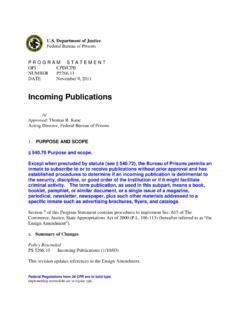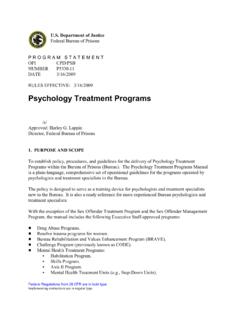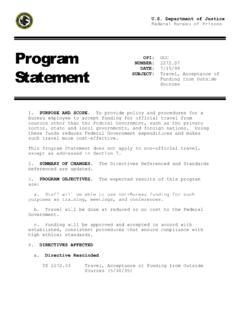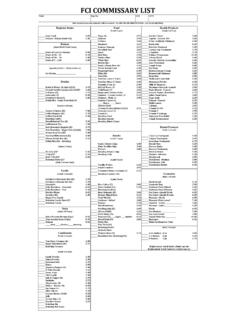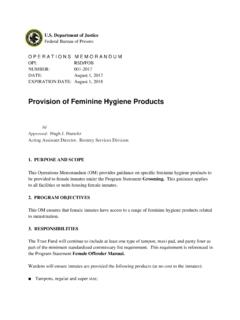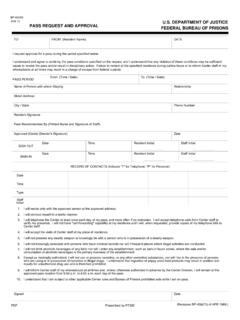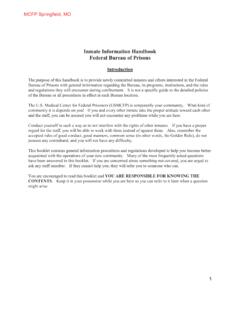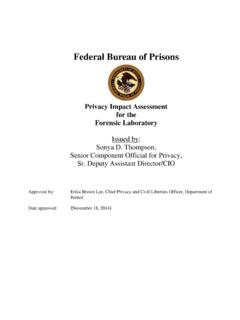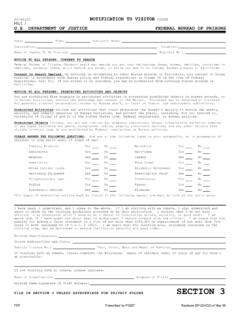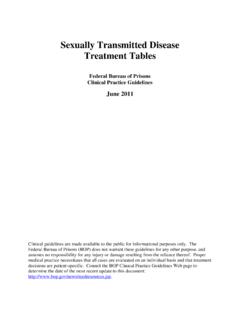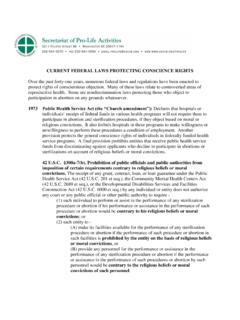Transcription of U.S. DEPARTMENT OF JUSTICE SEP 03 FEDERAL …
1 DEPARTMENT OF JUSTICESEP 03 FEDERAL bureau OF PRISONS INFORMATION ON VACCINATION (CONSENT, DECLINATION)FOR TETANUS VACCINEThe DiseaseTetanus is often a fatal disease caused by a bacteria known as Clostridium tetani. The bacteria isfound in soil, street dust, intestines and feces (stool) of dogs, cats, horses, sheep, cattle, rats,guinea pigs, and chickens. Manure-treated soil may be highly infectious. The bacteria is spread asit enters into humans through open wounds like punctures, cuts, scratches, and pinpricks that are mostapt to be on the hands, feet, and lower extremities of the body. One of the first signs is oftentrismus, otherwise known as lockjaw, and stiffness of the neck.
2 Persons may experience difficultyin swallowing and muscle tightness with spasms. The spasms may occur frequently or become continuousover a few weeks. The disease can become fatal when the respiratory and abdominal muscles are affectedand complications occur. It can lead to seizures, coma, and even death. Approximately 30% of the casesreported are is not transmitted from person to person. It is spread when the bacteria gains entry into anopen area of the body. Cases of tetanus have been associated with animal injuries, wounds or injuries,wound infections, contaminated equipment used for invasive purposes. Tetanus is an infectious disease that can be prevented through use of a vaccine. Tetanus infection doesnot mean lifelong immunity.
3 Although cases are rare in the United States, cases still exist throughoutthe world and more frequently in populated areas where it is hot with damp climates, ie. Southeastcountries; and areas with rich VaccineTetanus Toxoid Vaccine is a formalin-treated toxoid that is highly effective and is supplied in twotypes. Tetanus toxoid is made as an adsorbed (aluminum precipitated) toxoid and a fluid toxoid. Inclinical studies, the adsorbed toxoids have been found to be more effective than the fluid toxoid, basedon the level of titer and the length of protection which is obtained. The vaccine is storedcontinuously in the refrigerator (not frozen). Currently the toxoid is recommended as a routine vaccination given every ten years for all ages, andis appropriate to consider an update of the vaccination when there is a lapse of five years or more andthe person has experienced an acute injury or has a wound.
4 The next booster is not given for ten with any vaccine, persons with impaired immunity or with kidney failure on dialysis may have a poorerantibody response to vaccination. Dosing SchedulesTetanus toxoid is generally given as a primary series of three doses and one booster injection everyten years. The primary series is given at four to eight weeks apart for the first two doses followedby a third dose at six to twelve months after the second dose. It is administered ( )intramuscularly in either the anterolateral aspect of the upper thigh or the deltoid muscle of the who have not completed the primary vaccine series should receive an initial booster and beconsidered for IG, in the event of an acute injury.
5 Measures should be taken to complete the primaryvaccination series. There is no need to restart the vaccination for persons who have had interruptionof the recommended schedule. Post vaccination testing is not routinely indicated because of the knownhigh rate of vaccine ReactionsTetanus toxoid has been associated with reported adverse reactions including redness, swelling, painat the injection site, fever, chills, aches, and headache. As with any vaccine, however, it is possiblethat expanded commercial use of the vaccine could reveal rare adverse reactions not observed in clinicalstudies. More serious neurologic reactions have been reported and allergic reactions are you have any questions about Tetanus Toxoid vaccination, please :SSN:Institution:ContraindicationsHypers ensitivity or neurologic symptoms to any component of the vaccine is a contraindication for useof the experiencing hypersensitivity after a Tetanus Toxoid Vaccine injection should not receivefurther injections.
6 Tetanus infection has an average incubation period of eight days and generallyoccurs anywhere from three days to three weeks. The shorter the incubation period, the greater therisk. Tetanus Toxoid Vaccination may not prevent tetanus infection in persons with unrecognized tetanusinfection at the time of vaccine on limited data, tetanus toxoid vaccine contains no components that have been shown to pose a riskto the fetus or newborn. Pregnancy should not be considered a contraindication to vaccination for womenat high risk of acquiring tetanus infection, since tetanus poses a risk to the fetus or women or women or childbearing age who may be pregnant should discuss the risks and benefitsof tetanus toxoid vaccination with their physician.
7 Approval from Physician____Yes, approved for vaccination _____No, not approved for vaccination_____Physician's Signature Date**CONSENT FORMI,_____, have read the above statement about Tetanus and the Tetanus ToxoidVaccine. I have been provided with updated information and have had the opportunity to ask questionsabout the benefits and risks of Tetanus Toxoid Vaccination. I understand that there is no guaranteethat I will become immune to future tetanus infection, and that there is a possibility that I willexperience an adverse side effect from the WOMENB ased on limited data, Tetanus Toxoid Vaccine contains no components that have been shown to pose a riskto the fetus or newborn. Pregnancy should not be considered a contraindication to vaccination for womenat high risk of acquiring tetanus infection, since tetanus poses a risk to the fetus or newborn.
8 I havebeen advised, however, to review the risks and benefits of vaccination with my physician, if I ampregnant or am of childbearing age and have reason to believe that I may be _____Signature of Recipient Date Signature of Witness**Tetanus Toxoid Declination (MANDATORY WHEN APPLICABLE)I understand that due to my potential risk of injury and chance of contracting the bacteria through anopen injury/wound, I may be at risk of acquiring tetanus infection. I have been given the opportunityto be vaccinated with tetanus toxoid vaccine, at no charge to myself.
9 However, I decline tetanus toxoidvaccination at this time. I understand that by declining this vaccine, I continue to be at risk ofacquiring tetanus toxoid and severe complication. _____Signature of Patient Date Signature of Witness(This form may be replicated via WP)
